Mass Protest Erupts in Bengaluru Against Waqf Amendment Act 2025
Citizens across faiths unite at Freedom Park to defend constitutional rights
Bengaluru, April 20, 2025 — In a powerful display of unity and dissent, over 500 people from across religious and social communities gathered at Freedom Park on Sunday to protest against the recently passed Waqf Amendment Act 2025. Organized by the civil society collective Hum Samvidhan Ke Log, the protest voiced strong opposition to what is being described as an “unconstitutional and anti-people” law that undermines religious autonomy and threatens minority rights.
The crowd, representing Dalits, OBCs, Christians, Sikhs, Buddhists, and Muslims, raised slogans to #SaveWaqfSaveConstitution, warning that the Act is not merely a Muslim issue, but a direct attack on India’s secular and democratic fabric.
Waqf Amendment Sparks Outrage Across Communities
The Waqf Amendment Act, passed on April 8, 2025, has triggered alarm among legal experts, activists, and minority communities, who argue that the legislation strips away long-standing protections for religious and cultural institutions. Critics claim the Act centralizes control over Waqf properties, potentially paving the way for large-scale encroachments and privatization of community assets.
“This Act violates constitutional guarantees of religious freedom and property rights,” said Advocate B.T. Venkatesh, addressing the gathering. “It is not just a legal issue—it’s an attack on the very essence of India’s pluralistic democracy.”
Protest Draws Diverse Voices in Solidarity
The rally saw fiery speeches from prominent activists, academics, and community leaders, all of whom called for the immediate repeal of the Act and the start of a broader people’s movement.
“This legislation is a warning bell for every community in India,” said Revathi Raj, a social activist. “If they can do this to one group today, they can do it to anyone tomorrow. We must stand united.”
Prof. Shivasundar, a political commentator, emphasized that the resistance must be rooted in constitutional values. “Our fight is not only against the Waqf Amendment, but against the systemic erosion of rights and representation. This is a moment to reclaim the spirit of the Constitution.”
A Call for Sustained Resistance
Participants at the protest echoed the sentiment that the struggle was far from over. Drawing inspiration from the farmers’ movement, Hum Samvidhan Ke Log announced plans to escalate protests in the coming weeks, including legal challenges, outreach campaigns, and coordinated actions in other states.
“This is not a one-day protest—it’s the beginning of a sustained people’s resistance,” said Hebbala Venkatesh, a trade union leader. “We will not rest until this draconian law is rolled back.”
Maulana Firdaus, representing the Muslim community, remarked, “This is not just a Muslim issue. This is a collective constitutional crisis. When rights of any community are trampled, the whole nation bleeds.”
United Voices Across India’s Margins
Speakers at the event reiterated that the Amendment must be seen as part of a wider pattern of state control and marginalization of vulnerable communities.
Bhanu Prakash, a Dalit rights advocate, said, “We are fighting not only for religious autonomy, but for dignity. Today it’s Waqf, tomorrow it could be our lands, our education, our voice.”
Mohan Raju, an OBC organizer, added, “This Act seeks to weaken communities by controlling their institutions. It is a silent strategy of disempowerment.”
Beyond Identity: A Fight for Constitutional Justice
The protest struck a chord by framing the issue as a national concern, urging citizens from all backgrounds to take a stand.
“This fight is not about identity, it’s about justice,” said Yusuf Kanni, a jamaat e islami leader. “We must uphold the Constitution, not just for ourselves, but for future generations.”
A.J. Khan, a dalit leader, called for mobilization across campuses and neighborhoods. “Young people must rise. This is a test of our generation’s commitment to liberty and justice.”
Maari, a grassroots organizer from Tamil Nadu, concluded with a stirring appeal: “The Constitution belongs to the people, not the Parliament alone. If we do not defend it now, we may not have a chance later.”
What Lies Ahead
As the sun set over Freedom Park, chants of “Samvidhan Bachao!” echoed across the grounds. The protest ended with a pledge to carry the struggle forward in every corner of the country.
With legal petitions being prepared and a national coordination committee in formation, the movement against the Waqf Amendment Act 2025 appears poised to grow in scale and determination. For many, today was not just a protest—it was the awakening of a broader, people-powered constitutional defense.
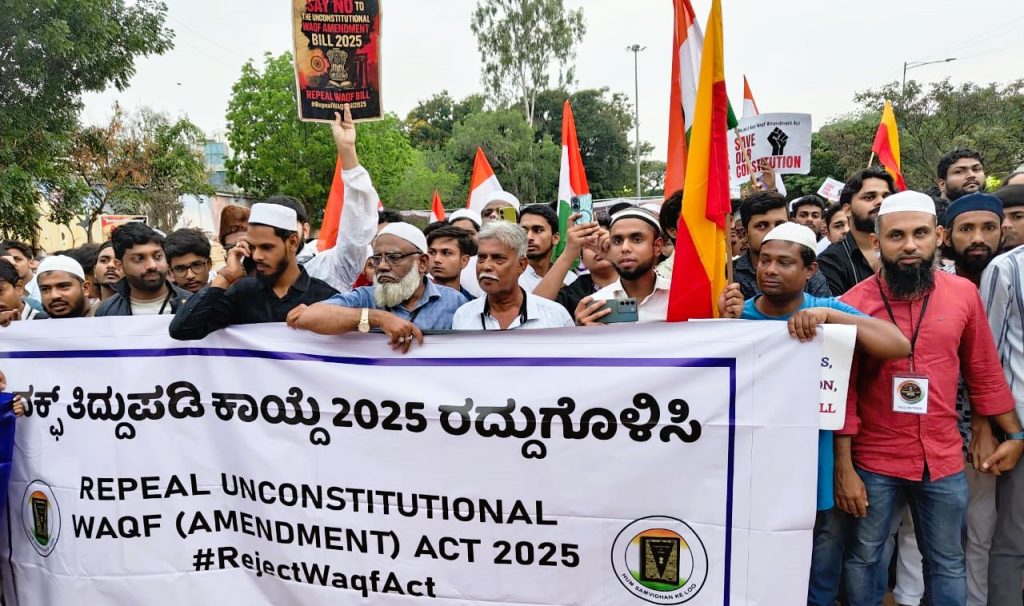
🔹 QUOTES
Advocate B.T. Venkatesh
“The Waqf Amendment Act 2025 is a constitutional travesty. It dismantles the very framework of religious autonomy protected by the Constitution.”
Revathi Raj
“What starts with Waqf can extend to churches, temples, and gurudwaras. This is a warning shot—we must act now.”
Prof. Shivasundar
“The attack on Waqf is part of a broader authoritarian shift. This isn’t about reform, it’s about control.”
Hebbala Venkatesh
“We won’t allow our institutions to be taken over in silence. This is our Freedom Park moment—our resistance begins here.”
Maulana Firdaus
“This is not just a Muslim fight—it is a battle for India’s secular soul. Every Indian should be outraged.”
Bhanu Prakash
“Marginalized communities have seen this playbook before. Today it’s Waqf, tomorrow it could be Dalit land and institutions.”
Mohan Raju
“This Act seeks to divide and disempower. But our united protest today proves we will not be silenced.”
Yusuf Kanni
“We are not just resisting a law—we’re resisting the erosion of our democratic values. The Constitution is our line in the sand.”
A.J. Khan
“Young people must rise and reclaim the narrative. Our generation must not remain silent spectators.”
Maari
“This is people’s resistance against corporate greed and political control. The fight for justice starts at the grassroots.”
🔹 Q&A on Anti Waqf Act Agitation
Q: Why is the Waqf Amendment Act being opposed?
A: Critics say it strips Waqf Boards of autonomy and centralizes control, paving the way for illegal encroachments and privatization of community assets.
Q: Who are protesting and why?
A: A diverse coalition of Dalits, OBCs, Muslims, Christians, Sikhs, and Buddhists gathered to protect constitutional rights and oppose government overreach.
Q: Is this only a Muslim issue?
A: No. Protesters emphasize that the Act affects all communities and sets a dangerous precedent for dismantling minority institutions across faiths.
Q: What’s next in the movement?
A: Organizers have announced long-term protests, legal battles, and wider coordination across states to demand a complete repeal of the Act.
🔹 Background
The Waqf Amendment Act 2025, passed on April 8, has become a flashpoint in India’s socio-political landscape. The Act is perceived as undermining the autonomy of Waqf Boards—statutory bodies managing properties donated for religious or charitable use by the Muslim community.
Activists allege that the amendment allows state and central governments to exert undue control over Waqf properties, potentially enabling land grabs and corporate takeovers of valuable urban real estate. Legal experts argue it violates Articles 25 and 26 of the Indian Constitution, which guarantee freedom of religion and the right to manage religious affairs.
The protest at Freedom Park, Bengaluru, marks the beginning of a larger national resistance. Drawing inspiration from the farmers’ protests and constitutional movements, Hum Samvidhan Ke Log has vowed to escalate the campaign.
#SaveWaqfSaveConstitution #RepealWaqfAmendment #StandWithWaqf #SamvidhanBachao #PeopleVsPower #DefendConstitution #UnityInResistance #BangaloreProtest #WaqfUnderAttack #HumSamvidhanKeLog
![]()


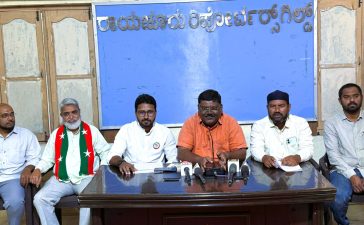
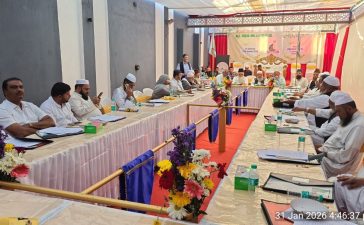
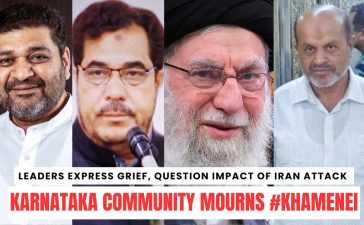
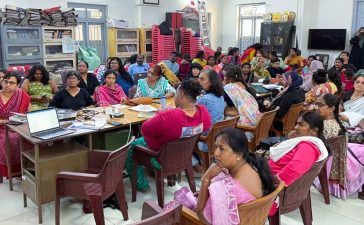






Excellent report. Captured essence of today’s protest with such clarity. Immense Thanks